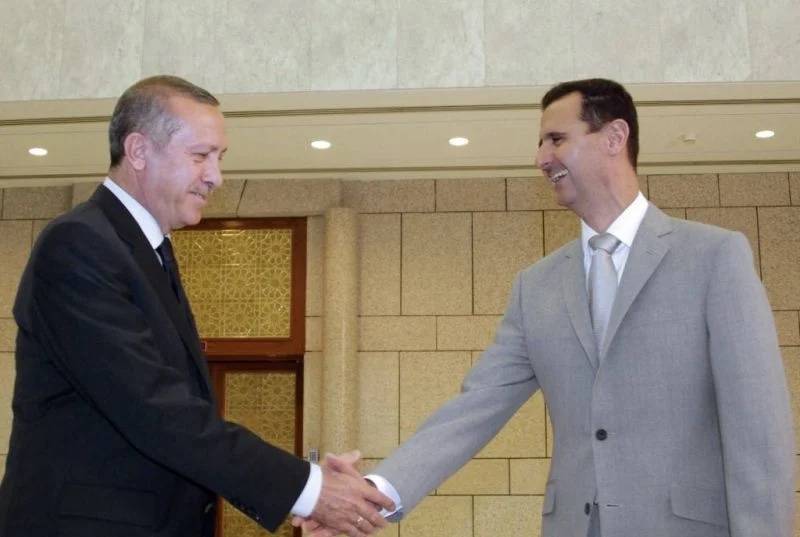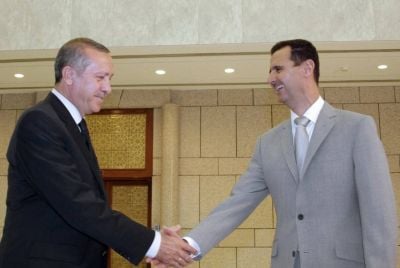
Bashar al-Assad shaking hands with Recep Tayyip Erdogan, then Prime Minister of Turkey, visiting Damascus, Oct. 11, 2010. (Cedit: AFP file)
What we know:
· This is a first since the beginning of the Syrian conflict in 2011. Hulusi Akar and Ali Mahmoud Abbas, the Turkish and Syrian defense ministers, exchanged views on Dec. 28 in Moscow alongside their Russian counterpart Sergei Shoigu on “ways to resolve the Syrian crisis and the refugee issue,” as well as on “joint efforts to combat extremist groups,” according to a Russian Defense Ministry statement.
· The high-level meeting comes after early signals of bilateral rapprochement. According to Reuters, intelligence chiefs from both countries had met several times in Damascus as early as September. Then, on Nov. 17, Turkish President Recep Tayyip Erdogan deemed a meeting with his Syrian counterpart Bashar al-Assad possible, stating that there was “no room for resentment in politics.”
The context:
· This rapprochement suggests the beginning of a 180-degree turn in relations between Ankara and Damascus, as Erdogan has long sworn to the fall of Bashar al-Assad, whom he has described as a “murderer” on several occasions in recent years. But, in reality, Ankara has long since changed its tune with its southern neighbor, says Elizabeth Tsurkov, a researcher at the Newlines Institute for Strategy and Policy. After actively supporting the Syrian armed opposition in the wake of Russia’s pro-regime intervention in 2015, “Ankara began to focus its efforts on fighting the Syrian Democratic Forces.” The SDF are an ally of the United States in its fight against the Islamic State (IS) in Syria. The main component of the SDF is the majority-Kurdish People’s Protection Units militia (YPG), which Turkey designates as a terrorist organization because of its links to the Kurdistan Workers’ Party (PKK).
· The Moscow meeting comes more than a month after Turkey launched Operation Claw-Sward against the Kurds in Syria and Iraq, following a deadly attack on the popular Istiklal Street in Istanbul in mid-November. Ankara is also threatening a new ground invasion in northern Syria, brandishing this threat as much to fight against Kurdish armed groups as to create a “buffer zone” to encourage the return of some 3.5 million Syrian refugees present on its soil.
· However, Russia and Iran, the two main supporters of Syria, have been working behind the scenes to avoid a new Turkish military intervention. Under their pressure, Erdogan has still not launched the operation, which he presents internally as a solution to the return of Syrian refugees, who face increasingly less welcome in a country grappling with an economic crisis. Feeling his hold on power threatened in the run-up to the Turkish general elections scheduled for June 2023, the Turkish president had to show his electorate that he is ready to take a different path. According to Tsurkov, “Erdogan is constantly being shot down on this issue by opposition parties, who say they are ready to normalize relations with the Syrian regime in order to send refugees back to Syria if they win the elections.” Warming up relations with Damascus is a way for Erdogan to beat the Turkish opposition to the punch, adds Aron Lund, a researcher at the Century Foundation.
The stakes:
· On the Syrian regime’s side, any normalization is symbolically important. “It is an admission of failure by governments that have previously tried to bring about the fall of the regime,” Tsurkov says. Ankara was the main supporter of the Syrian opposition and continues to support armed rebel groups in the north of the country. However, there are still many challenges in this regard, including the presence of Turkish armed forces in Syria, which the regime sees as an occupation.
· The symbolic victory also reflects on Moscow, Damascus’s political patron which is at the origin of this trilateral dialogue. The meeting comes “at the expense of the US, which pursues a policy of isolation and sanctions against the Syrian regime,” Tsurkov says. Russia also seeks to accelerate the prospect of rebuilding Syria, without having to pay the cost. “The more countries that normalize their relations with Syria, the more investment prospects there will be to turn the heap of ruins that is currently this country into a success story,” she adds. The reconstruction of Syria is estimated to cost several hundred billion dollars.
· For now, “signals of normalization will continue before the elections in Turkey, but we should not expect real changes on the ground,” according to Tsurkov, because the Syrian regime is unable to meet Turkey’s two main expectations: the fight against the SDF and the possibility of a mass return of refugees.
· While Damascus and Ankara will not resolve all their differences, this rapprochement can nevertheless set a de-escalation in motion, according to Lund. Currently, rapprochement efforts are already set to continue with a meeting between the two countries’ foreign ministers, which is slated to take in the coming months, according to Turkish Foreign Minister Mevlüt Çavuşoğlu. Eventually, if talks progress, cooperation could take several forms, including on the Kurdish “issue,” according to Lund. “One of them could be the creation of joint operations, or joint political and economic pressure against the Kurds,” he says.
· Finally, for Syrians opposed to the regime living in Turkey or in Syrian areas controlled by Ankara, this rapprochement is “obviously bad news,” according to Lund. In the future, “I don’t think we will see mass deportations, but activists will feel threatened, it is possible that the Turkish government will start to control their activities more firmly, or even close down some media.”
This article was originally published in French in L'Orient-Le Jour. Translation by Sahar Ghoussoub.
